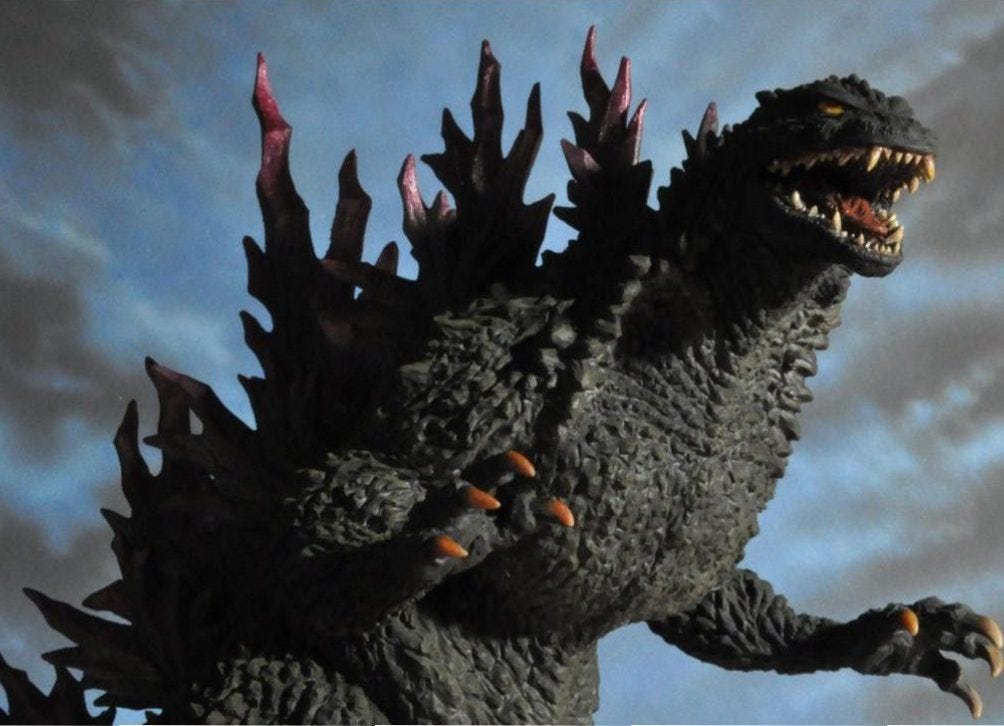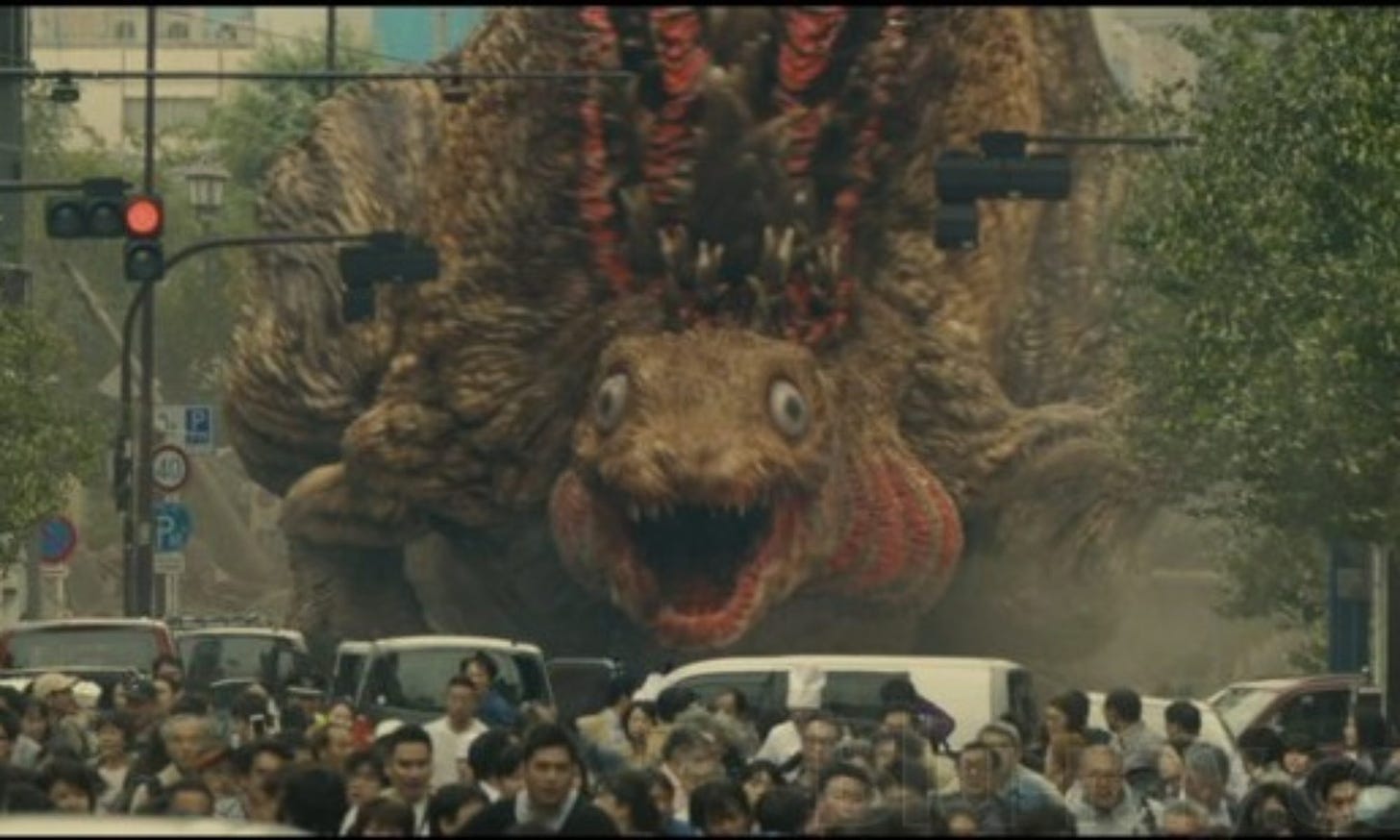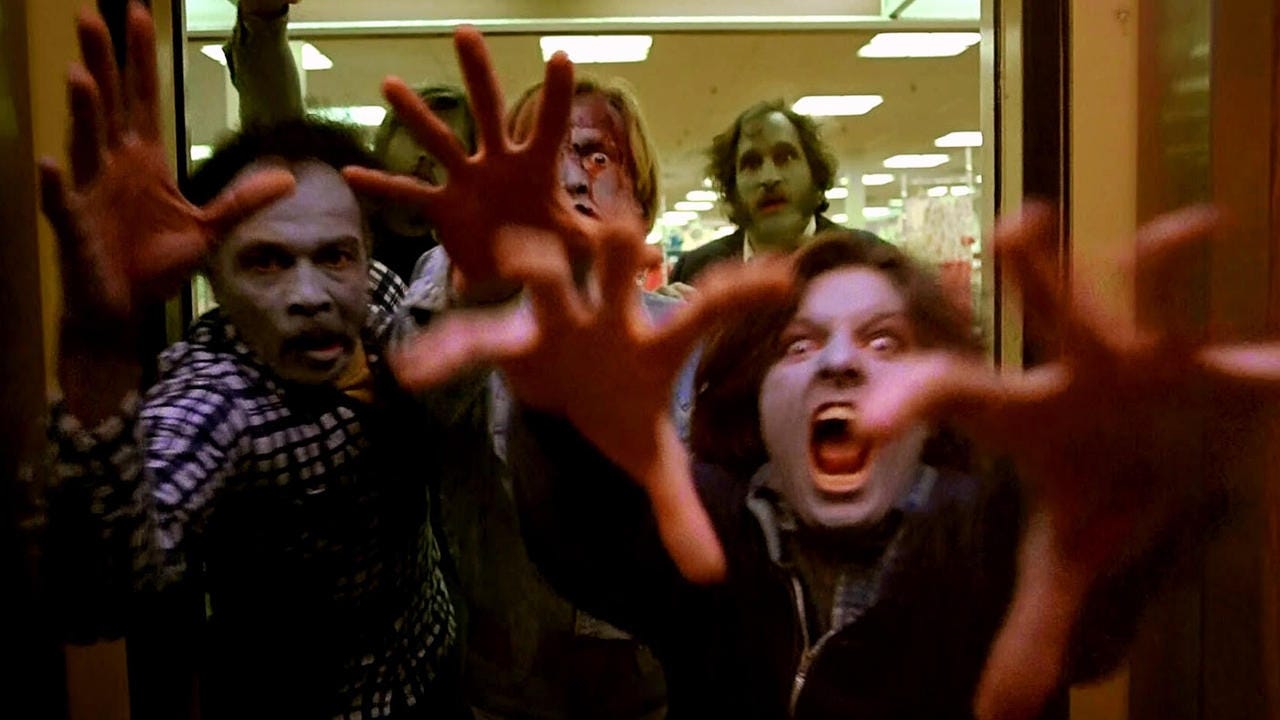Beware of Unfounded Optimism: Shin Godzilla and Other Instructive Apocalypses
Sometimes the bleakest of kaiju movies and visions of relentless zombie hordes are the best way sense of the world.
When Godzilla makes his first appearance in the 2016 film Shin Godzilla it’s not his size that strikes terror. It’s the eyes. Sure, the size helps, but this fresh-start take on the atomic-powered monster arrives in Tokyo with a pair of unblinking eyes that betray no hint of any kind of inner life. Later to evolve into a more familiar, dinosaur-like beast, Godzilla first crawls ashore as a kind of super-sized lungfish, spewing liquid from his gills and leaving destruction in his wake as his unthinking body lurches through the outskirts of the Japanese metropolis. He doesn’t care what it kills or even seem to comprehend what he’s doing at all. He’s literally a walking disaster, one that can’t be reasoned with or easily defeated, one that has to be endured — if that’s possible.
Released by Toho 62 years after the original Godzilla (or Gojira, if you prefer), Shin Godzilla attempts to return the series to its roots, drawing as direct a parallel to the 2011 Fukushima Daiichi nuclear power plant disaster as Ishiro Honda’s 1954’s original did to the atomic bombing of Hiroshima and Nagasaki. It essentially erases the years and movies in-between — all the kid-friendly sequels that softened Godzilla and turned him into an ally against other monsters, the two previous reboots from Toho Pictures, the two American (and Americanized) remakes — and starts over. Shin Godzilla retains a couple of familiar elements from the later films, like bits of Akira Ifukube’s remarkable score and, eventually, that unmistakable roar, and occasional nods to the past, like a discussion of Godzilla’s name and how he got it. But it’s otherwise a return to first Godzilla principles. The monster is a metaphor for a recent catastrophe and embodies that catastrophe’s horror in its fullness.
The Reveal is a reader-supported newsletter dedicated to bringing you great essays, reviews and conversation about movies (and a little TV). While both free and paid subscriptions are available, please consider a paid subscription to support our long-term sustainability.
Shin Godzilla also extends that metaphor’s reach. Co-directed by Hideaki Anno and Shinji Higuchi (both central to the beloved animé series Neon Genesis Evangelion), it’s filled with satirical references to the bureaucracy and career maneuvering of Japanese politics. A pair of confessions: I’m no expert on Japanese politics. Nor am I well-versed in the previous work of Anno and Higuchi beyond broad strokes. Having never seen Neon Genesis Evangelion (I know, I know), most of my knowledge comes from a 2019 episode of the Imaginary Worlds podcast that frames the series in part as an expression of Anno’s struggles with depression. I also don’t think it requires intimate knowledge of either of those topics to recognize the way Shin Godzilla taps into some universal truths about the value of turning our worst fears and dimmest visions of the future into art, or about the way the institutions charged with our well-being are often undone by short-sightedness, selfishness, and a refusal to admit mistakes.
As the Godzila crisis unfolds, the government finds itself ill equipped to deal with an event so unforeseeable or the seemingly endless devastation it might visit on the country. Scene after scene introduces new characters, new titles, and new locations, each receiving its own bit of explanatory on-screen text that hits the screen simultaneously with the subtitled dialogue. For those of us who don’t speak Japanese, it becomes, in the most literal sense, a difficult film to watch, forcing viewers’ eyes to dart between words at opposite ends of the screen while still processing the visual information unfolding within the frame. That rush of information is likely difficult to process even for native Japanese speakers. Not that keeping up with every detail matters much as the pile-up of bureaucracy and credentialed experts does little to forestall catastrophe. That so few of the characters ultimately end up making much of a difference to the story seems to be by satirical design. Here’s a multitude of the best and the brightest, all parts of a meticulously structured system designed to keep us safe. They’re not up to the job.
Eventually a hero does rise to the occasion in the form of Rando (Hiroki Hasegawa), a Deputy Chief Cabinet Secretary, who looks at the government’s monster-repelling attempts with a jaded eye, even after Godzilla disappears for parts unknown after the first attack. As Tokyo starts to get back to normal — depicted by scenes of everyday life resuming in the midst of the rubble — he sounds a note of caution, recalling the half-truths and wishful thinking promoted during World War II and warning the others to “beware of unfounded optimism.” This being a Godzilla movie, however unusual a Godzilla movie, he’s soon proven right.
Shin Godzilla is a way of talking about Fukushima without really talking about Fukushima, but it has broader applications. Though I meant to watch the movie for years — a huge hit in Japan, it only played a few special engagement screenings in the U.S. — I didn’t get around to it until deep into the Covid-19 pandemic, a crisis whose mounting death toll could be directly traced to unfounded optimism (in the kindest possible interpretation of a government-encouraged national state of denial). Even then, watching this took some prompting, specifically a call from a friend who’d seen the movie and wanted my thoughts on it.
In the midst of a tough year predating the pandemic he’d taken a weird sort of comfort from this movie, watching it repeatedly. That sounds counterintuitive, but I appreciate that movie visions of the unthinkable can in some ways be sources of comfort. This past December, as political violence seemed increasingly inevitable in America, I woke up early on my birthday. I'm note sure why, but in the peace and quiet I felt strangely compelled to watch one of my favorite movies, a film I hadn’t seen in years: George Romero’s Dawn of the Dead.
A bit of background, for those who’ve never seen it: released in 1978, Dawn of the Dead is Romero’s sequel to his 1968 classic Night of the Living Dead, one as tailor-made for its era as Night was for the late-1960s. It follows a group of four survivors who flee a Philadelphia on the verge of falling to zombie hordes in search of a safer place. They find one, they believe, at a Pennsylvania shopping mall. After clearing it of zombies, they set up a life for themselves making free use of all the mall has to offer, reveling in abundance and luxury. This, too, meets with disaster, but not before sourness and dissatisfaction sets in. They have everything (well, except for the one who dies of a zombie bite). It’s not enough.
I could probably intellectually take apart why I keep coming back to this movie, which I first saw as a teen.* I could talk about how history has confirmed its prescience, and how scene after scene in the real world of 2020 (and beyond) was reminiscent of it. (Even before the storming of that Capitol on January 6th, protests at state capitals, including one at my home state of Ohio, called its hordes to mind. I wasn’t alone in seeing the connection.) I could even point to some particular points of appeal, like the way it stirs memories of how shopping malls looked when I was a kid in the 1970s. (Hickory Farms!) But the truth is, like a lot of my favorite movies, I don’t honestly know why I keep coming back to it. Unlike Shin Godzilla, it doesn’t even offer a happy(ish) ending, just a hint of long shot hopefulness that Romero substituted in for an even bleaker ending at the last moment.
Maybe it’s just there’s something comforting, for those of us who sometimes have a hard time summoning up optimism, unfounded or otherwise, in watching our worst fear confirmed; that this world we’ve put together could fall apart at any moment no matter what we do. It may not be zombies or giant lizards doing the destroying. Maybe it’ll never even happen at all. But knowing it could and carrying that burden while others seemingly walk around untroubled can feel a bit lonely. Watching chaos in the safety of the dark, it’s sometimes easier to feel a little less alone.
*Like many of the key films I saw in my movie-hungry youth we had to seek out a video store liberal or uncaring enough to rent this one to us. It’s kind of hard to see now, though, for dumb copyright reasons. I bought an import 4K Blu-ray set though it looks like there are some less expensive imports on the market now.
— For Todd







This piece reminds me of how in my early 20s, going through a rough time, I kept turning for comfort to ... FULL METAL JACKET. Specifically the first third. I'd watch the boot camp sequence, then hit stop on the tape, and say to myself, "at least my life isn't that bad", and legitimately feel better.
Not sure if that chimes at all with you, but I do think that's a comfort of the apocalyptic, and even in terrible times there are worse ravages than the one we currently face.
Oh yeah, love Shin Godzilla! I was lucky enough to see its one theatrical presentation here in Nova Scotia. My buddy and I showed up 20 minutes before it began, thinking it was going to be pretty quiet...only to end up sitting in the front row. It was...something...to watch that movie from that vantage point while reading the subtitles, character names and positions in Japanese, translated into English. Even under those circumstances, the movie was a wild and wonderful ride. I've since watched it a number of times on blu ray at home, and I'd go so far as to say it's in the top five best Godzilla films from the whole series (it may even be number 2 or 3 for me). It's definitely a darker film than, say, Ebirah: Horror of the Deep or Godzilla Vs Mothra, and it has some truly stark and artistic touches (like the close up of Godzilla's tale at the end of the film...a very disturbing image that could be open to many interpretations).
My personal favourite moment of situational comedy from the film is when the newly minted PM looks at his cold noodles and says something to the effect that he knew the job wouldn't be easy. So many weird little grace notes, and the mounting absurdity and irony is pretty much relentless throughout.
I think, in the same way that you treat Dawn of the Dead, I treat Friedkin's Sorcerer (which I only watched because of the Dissolve review way back when). I've watched that movie at least a dozen times, and it's taken on a sort of comforting place in my personal movie pantheon. Finding comfort in the hopeless and desperate circumstances of those characters perhaps reveals something about myself, but I could watch that movie any time, and it always engenders a hard to explain warmth in my soul.